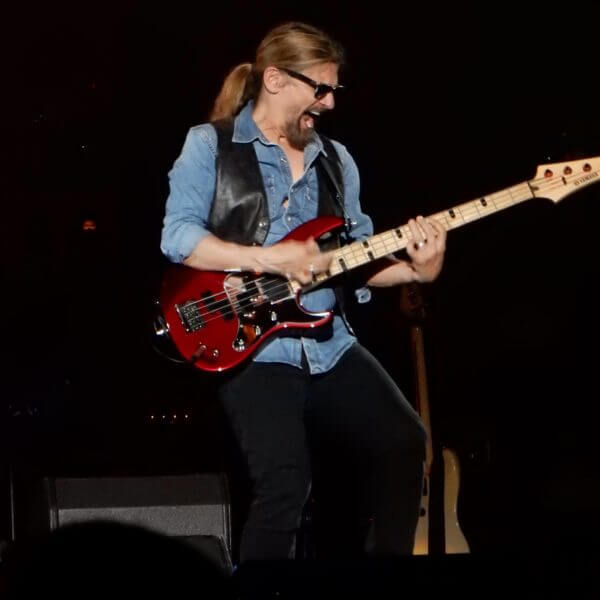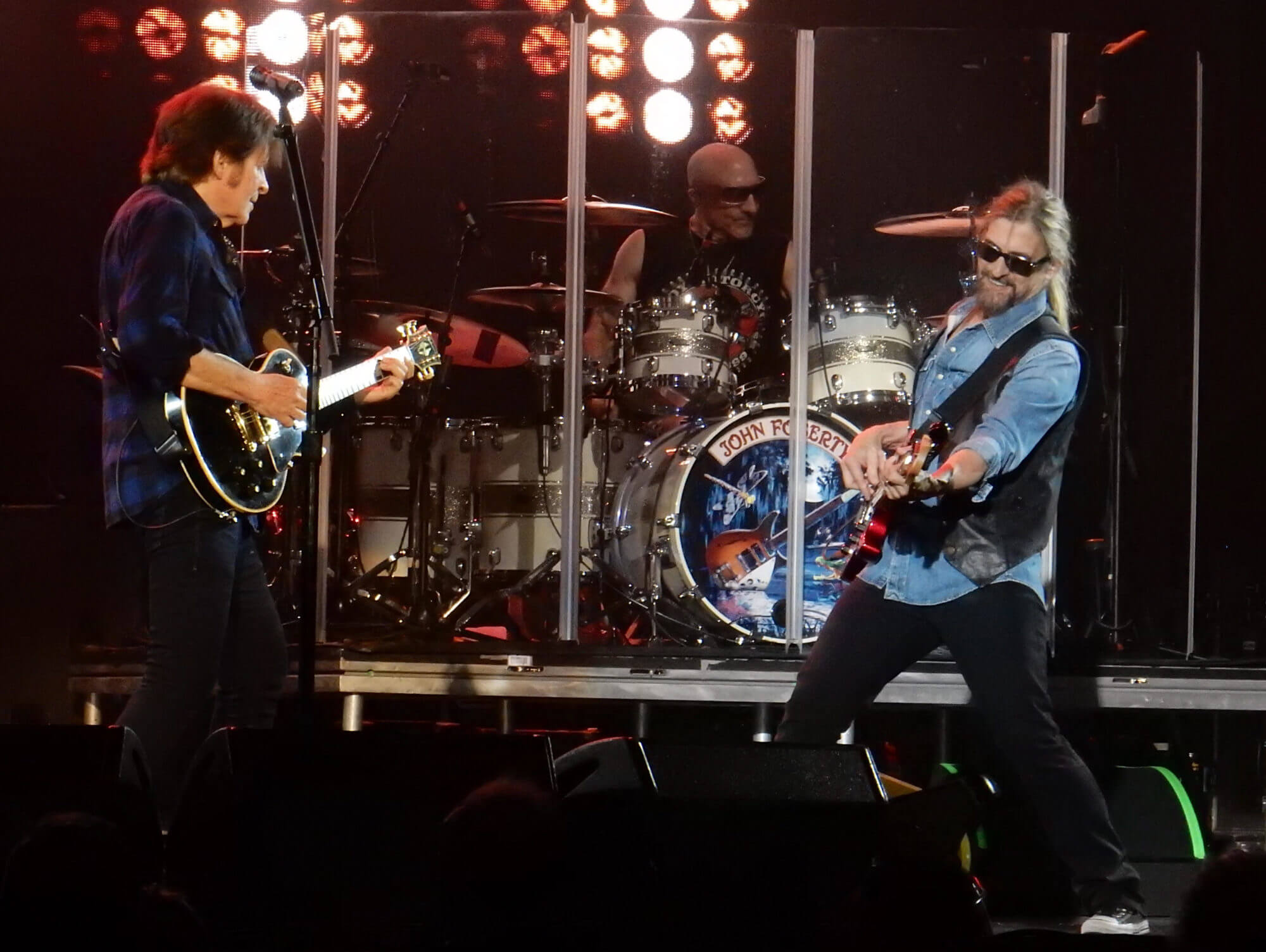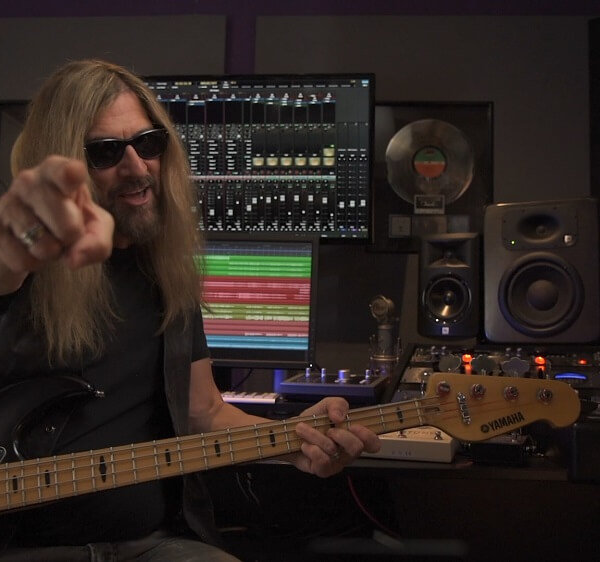James LoMenzo is a self-professed ‘journeyman’ bass player best known in the heavy metal arena for playing with Megadeth, Ozzy Osbourne, White Lion, Slash’s Snakepit and Zakk Wylde among others. In between his busy touring schedule, he spends time in his own studio space which is packed full of bass guitars and peppered with Audient gear.
After putting together ‘The Definitive Guide To Recording Bass’ video series for us, sharing some key tips from his three decades in the music business, we took the opportunity to chat with him about his influences, inspiration and future plans.
But first, we asked him about the setup in his home city of Santa Clarita, CA (of course we did).
I bought this house about four years ago, It was intended to be an off-shoot of a work space I set up in Burbank which we called Monster House Productions. We named it that as much for the out-of-plum walls, as for my nostalgic love of classic horror films. I ran my production company out of there for about three years. We specialized in video and music production.
When my wife and I found our home in Santa Clarita, we chose it in part because of the tall ceiling in the garage which I assessed would make a splendid studio space. Consequently, just after moving in, my touring schedule kicked up so I never got to the point of implementing my studio design. I found the spare bedroom off the garage an adequate work space, so I set up a control room type of installation in there.
“When musicians ask me for an affordable recommendation for an interface I’ll always steer them to the iD14”
Since 90% of the work I do is either providing bass tracks to clients, mixing/mastering and composing to picture, it’s all the space I need to get things done. If I need to mic an amp or a kit, I simply run some cables or a snake to the garage put up some gobo’s and I’m off…
As we speak, I’m finalising my plans for the studio upgrade to the garage.
Describe your workflow.
There’s no definitive way that I work, depending on the initial spark, I could simply start by humming something. Or, maybe while I’m practicing, if I come across an interesting riff or chord series, I’ll drop that on my phone then take it home. Later, I’ll put it in a timeline and expand it from there.
Sometimes if I’m working on one song in a DAW and a new idea occurs to me, I’ll just go ten minutes or so out on the timeline, change the tempo and drop the idea right there so as to not let it get away.
“I was so pleased with the performance of the iD14 as I’d become so accustomed to the iD22.”
Then, of course, there are those wonderful live collaborations with other musicians in the room. Harder to come by these days but still my favourite way to create music.
What recording gear does every musician need?

Depends on the individual musician’s taste. There’s a lot of great low budget gear out there. These days there’s really nothing to hold you back from creating great sounding stuff with the minimal amount of gear. For quality sound it always goes to the interface and its converters. You can’t make great sounding music if you can’t get an honest perception of what you’re recording.
The big three things for me would be the interface, then monitor speakers, and then a great microphone. Computer, iPhone, tablet, all that is negotiable, as are the myriad of DAWS for each platform.
What Audient products do you have?
I currently own an iD22, an ASP880 and more recently an iD14. I picked up the iD14 to travel with, so I wouldn’t have to keep un-patching and disrupting my main studio setup. I was so pleased with the performance of the iD14 as I’d become so accustomed to the iD22. I don’t feel that I’m sacrificing anything sonically with the iD14.
“When I discovered the iD22, I was amazed at how close it brought me to the professional studio experience”
When musicians ask me for an affordable recommendation for an interface I’ll always steer them to the iD14. It’s sonically very competent.
What is the most important factor in choosing an audio interface as a bass player?
Again, I go with tone. Does the interface give you an accurate representation of your bass? Is the low end reading as ‘confident’, as opposed to ‘muddy’ or ‘weak’. Do the mid’s sit in a place that’s ‘three dimensional’ and ‘rich’ without sounding ‘strident’ or ‘choked’? Can you assess the high end content without it sounding ‘plastic-y’ or unrealistically ‘hard’?
A simpler way to put all this is, is the bass sound you’re hearing inspiring or distracting you from just making f**king music…?! (Laughs)
What do you love about your Audient gear?
For me it’s all about the way it sounds. When I discovered the iD22, I was amazed at how close it brought me to the professional studio experience that I had become familiar with throughout my years recording at some of the world’s great studios.
“Depth, clarity, imaging, punch, all at a very high bar level – all this in MY home studio, and for a seemingly ridiculously low cash outlay.”
Depth, clarity, imaging, punch, all at a very high bar level – all this in MY home studio, and for a seemingly ridiculously low cash outlay. When you combine that with easy universal connectivity and a crazy good set of monitoring features, it boggles the mind that there doesn’t seem to be a compromise between cost, sound & features.
Any specific features that stand out to you as the most beneficial?
I really like the ability on both the iD14 and iD22 to assign a button to sum mono into one speaker. I use that all the time to check my EQ balances between instruments when I’m tracking and mixing. The DI inputs are particularly good-sounding on bass and just about anything else.
I particularly like the DI’s on the ASP880 because of the variable high pass filter. I find it very useful to help sit a bass more forward by trimming off some sub bass energy.
What are the most important things people need to consider when trying to “make it” in the world of performance?
It’s all confidence! An important caveat to that point though is that real confidence only comes through preparation. Preparation can take on many forms. Of course, the main one is rehearsing your skills (instrumental, vocal, stage demeanour, etc.). When you are prepared (or truly rehearsed) this frees you to be in the moment. You can’t underestimate the power of being in the moment. This is what an audience will perceive as greatness. It’s the same thing we marvel at when sports figures seem to glide through the perfect play.
If you imagine the complexity of coordination the sports figure takes just to move their bodies unique physicality against gravity and opponents—all the while keeping their eye on the ball and the goal ahead AND looking for and being ready to thwart the unexpected ahead, …well, this is not unlike the process of performing a musical composition on stage.
Ok, so it’s not quite as external as in my sports analogy but I assure you, internally and externally there are just about as many moving parts. As a musician you must memorize the parts, visualize the movement of the music, look ahead for more challenging parts, all the while employing your unique physiology, be it finger dexterity, or in the case of drummers, limb independence.
“You can’t underestimate the power of being in the moment. This is what an audience will perceive as greatness”
Also, you have to be prepared for the unknowable, …drummer skips a beat, singer jumps to last verse. Preparation will reinforce your confidence to know and identify moments that are not planned. Audiences will literally gasp and then react when when you share these moments with them. How do you do this? You break that internal fear “lockdown” and use your skill and experience to navigate the moment, look from inside out and make that moment a shared moment.
Eye contact, body language: smile, wink, …bad ass-ary in motion!
The communication of your art, music in this case, is centrally relatable to everyone involved. When you can command that space and have it translate to an audience, that’s when I think you have “made it” as a performer.
What’s the best gig you ever played?
Usually the last one, …I can’t believe I still get to do this! I’ve gotten to play all my dream places with most of my dream artists, Madison Square Garden, The Greek Theater, a muddy field with several thousand of my closest Indian friends. Honestly, any gig is potentially the best gig I’ve ever played. I’m sure it’s always been that way for me.
“Sometimes I really miss those four-set-a-night ‘sweat-fest’ club gigs we used to play in New Jersey and Long Island”
Sometimes I really miss those four-set-a-night ‘sweat-fest’ club gigs we used to play in New Jersey and Long Island when I was a kid cutting my teeth. Those would go something like this, …I’d grab a commuter train after work to Long Island or New Jersey, meet up with the drummer, then we’d drive down to our practice room. There, we’d pack the truck, go to the club, set up the stage, the PA, hang the lights, play our four sets changing costumes between each set.
Then at the end of the night, tear it all down, load the truck, dump everything back at our rehearsal space, go to an all-night diner to wait for the trains to start running again. I’d get home to Brooklyn and to bed by 7:00am, sleep till the afternoon and get ready to do it all again every weekend. Those seemed like the greatest gigs I’ve ever played at the time!
What are you most proud of?
I think the fact that I managed to keep on staying musically relevant after my big ‘Hair-Band’ success in the 80’s. Looking back on it, that may be the thing I’m most proud of. A lot of people I knew got tripped up in the “insta-MTV-fame” of it all. They locked themselves into their persona’s so hard that when that style had lost its audience, a lot of those musicians became casualties of their own creation. I always felt like I kinda snuck out the back door, kept my nose down and stayed with the music. That’s where I’d always felt most comfortable.
You describe yourself as a ‘Journeyman Bass Player’, a title that infers learning, humility and open-mindedness. Is there a ‘master’ that you can say is your inspiration?
A master? No… I think I was really fortunate. When I was really young, before I was even aware of being a musical spirit my Dad was a real role model for me. He worked hard. He was in the construction trade but he had the heart and soul and the voice of a musician. He would always play a variety of music via his record collection for my brothers and me: Italian crooner records, classical, dance (which in the sixties were things like Mambo and Bossa Nova).
“I think [my Dad’s] example and his spirit kept me hard working and humble about who I am”
As time progressed, The Beatles came along, Dad embraced that too, then as I started showing interest in music he did all he could to help me find my way. He’d go off to work, come home then rent a van for my band to pack with gear, so we could play gigs.
I think his example and his spirit kept me hard working and humble about who I am. Ahh, but I still chase that “Jaco” dream* …but we bassists – don’t we all?
*Jaco Pastorius – ‘the world’s greatest bass player’
Where are you headed next?
Right now I’m on a plane headed to New Jersey. This time it’s a six week summer double bill, John Fogerty and ZZ Top ‘Blues and Bayous’ tour. After that, Canada, some more touring, a Clinic tour for Yamaha basses, a Vegas residency …I’m very excited to be coming ‘over the pond’ in October to headline a day of The Blues Fest at the 02. Right after that we jump over to Dublin!
Hopefully, somewhere in there, I’ll get that studio built…
Thanks so much for chatting with us, it’s been a real pleasure. And as for that studio – maybe you have everything you need after all?
~ Audient



